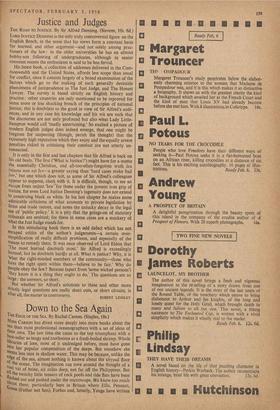Justice and Judges
THE ROAD TO JUSTICE. By Sir Alfred Denning. (Stevens, 10s. 6d.) LORD JUSTICE DENNING is the only truly controversial figure on the English Bench, in the sense that his views form a constant basis for learned, and other argument—and not solely among prac- !loners of the law : in the older universities he has an almost bobby-sox following of undergraduates, although in senior common rooms the enthusiasm is said to be less fervid.
His latest book, a collection of addresses delivered in the Com- monwealth and the United States, affords less scope than usual for conflict, since it consists largely of a broad examination of the factors which go to the making of such generally desirable phenomena of jurisprudence as The Just Judge, and The Honest Lawyer. The survey is based strictly on English history and practice: other countries are only mentioned to be reproved for some more or less shocking breach of the principles of national justice; this is doubtless to the good in view of Sir Alfred's audi- ences, and in any case his knowledge and his wit are such that the discourses are not only profound but also what Lady Little- hampton would call 'madly entertaining.' So exalted a picture of modern English judges does indeed emerge, that one might be forgiven for suspecting (though, perish the thought) that the extremely high reputation which they enjoy and the equally severe Penalties risked in criticising their conduct are not utterly un- connected.
It is only in the first and last chapters that Sir Alfred is back on his old beats. The first ('What is Justice?') might have for a motto the essentially Christian, and all-too-often-forgotten truth lex injusta non est lex—a greater saying than 'hard cases make bad law,' but one which does not, as some of Sir Alfred's colleagues appear to suppose, clash with it. It is difficult, though, to see an escape from unjust law''for those under the present iron grip of statute, for even Lord Justice Denning's ingenuity does not extend to construing black as white. In his last chapter he makes some admirable criticisms of what amounts to private legislation by firms and trade unions, and notes the unlucky decay in the legal use of 'public policy.' It is a pity that the goings-on of statutory tribunals are omitted; for these in some cases are a mockery of what the Just Judge stands for.
In this stimulating book there is an odd defect which has not escaped critics of the author's judgements—a certain over- simplification of really difficult problems, and especially of the Means to remedy them. It was once observed of Lord Eldon that The most learned doubteth most.' Sir Alfred is exceedingly learned, but he doubteth hardly at all. What is justice? Why, it is 'what the right-minded members of the community—those who have the right spirit within them—believe to be fair.' Why do People obey the law? Because (apart from 'some wicked persons') 'They know it is a thing they ought to do.' The questions are so large : the answers, so short.
But whether Sir Alfred's solutions to these and other more strictly legal questions are really short cuts, or short circuits, is


































 Previous page
Previous page